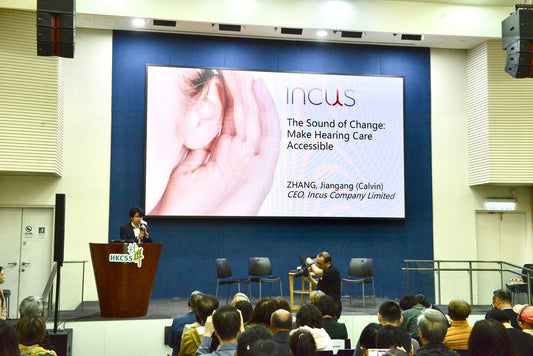
After realising they suffer from hearing loss or deafness, some patients seek medical help in hopes of fully recovering from hearing impairment. However, hearing loss is complex because numerous potential causes require different treatment methods. Unfortunately, there is often no known surgery or drug that could cure hearing loss.
Treatment for Different Hearing Loss Types
There are three main types of hearing loss, which require different treatment methods.
1. Conductive Hearing Loss
If you are diagnosed with conductive hearing loss, it means that sound cannot effectively pass through the external auditory canal to the eardrum and the small bones within your ears. It is related to various causes, including ear infections, congenital malformations of the outer or middle ear etc. Surgery (especially for congenital causes) or medication (such as antibiotics for ear infections) are usually used as treatment.
2. Sensorineural Hearing Loss
Also known as nerve-related hearing loss, sensorineural hearing loss is caused by damage in the inner ear or the nerve that connects the inner ear to the brain. The main causes of this type of hearing loss include head trauma, prolonged exposure to noise, disease, ototoxic drugs (drugs that damage hearing), and ageing. We do not know how to repair or replace inner ear cells once they are damaged. However, immediate medical help can slow down hearing health deterioration.
3. Mixed Hearing Loss
Mixed hearing loss is primarily caused by chronic suppurative otitis media or advanced otosclerosis. This could be treatable, especially with early medical attention. In the later stage, people usually wear hearing aids.
The Ongoing Search for a Hearing Loss Cure
For decades, researchers in labs worldwide have been working to find a cure for hearing loss. In particular, they have been working on a cure for sensorineural hearing loss.
So far, no cure is available, but will there ever be a cure for sensorineural hearing loss?
Perhaps.
There are several ongoing projects which seem promising, and a hearing loss cure could be on the horizon:
Stem Cell Research
Researchers are investigating the potential of having stem cells develop to - and function as - hair cells. Scientists have discovered the presence of stem cells in the inner ears of mice, chicks, and zebrafish. Stem cells can under the right conditions develop into cells that are remarkably similar to hair cells. Although a cure does not yet exist, the results obtained thus far are promising. Researchers at Stanford Medicine, Rutgers University, MIT, Brigham and Women’s Hospital, and Massachusetts Eye and Ear have all been making progress with research involving stem cells and hearing loss. Besides, scientists at Kyoto University in Japan have conducted research that may help with hearing loss and tinnitus.
Progenitor Cell Activation Research
A biotech company called Frequency Therapeutics has been developing an injectable drug called FX-322 to treat sensorineural hearing loss by regenerating hair cells through the activation of cells already present in the cochlea. The working principle is called progenitor cell activation, which is similar to - but not the same as - stem cell research. FX-322 uses progenitor cells to generate inner hair cells and restore hearing ability.
Frequency Therapeutics Gives Up The Search For A Hearing Loss Cure
Double-Blind Placebo-Controlled Study Shows FX-322 Is Not Effective For Treating Sensorineural Hearing Loss
Frequency Therapeutics show the hearing care world with an announcement on 13th February 2023:
On 13 Feb 2023 they immediately stopped all research and development efforts towards finding a cure for sensorineural hearing loss.
They had analyzed the results of their so-called FX-322-208 clinical trial, where they administered FX-322 in subjects 18 to 65 years with acquired sensorineural hearing loss.
142 participants were enrolled in the study. The study was double-blind placebo-controlled. This means some received a single dose of FX-322, while others received a Placebo treatment instead, and that neither the subjects nor the staff administering the doses knew who would receive the real treatment.
In the study, researchers measured the participants’ ability to correctly recognize speech in a quiet environment before and 90 days after the treatment (or Placebo).
They also measured whether the participants’ ability to recognize speech in noise as well as pure tone hearing thresholds and self-perceived hearing loss would change.
Unfortunately, the data showed no difference between the group that received FX-322 and the Placebo group.
In other words, the data showed that FX-322 does not cure sensorineural hearing loss.
Development of FX-345 Is Also Cancelled
On the same day, Frequency Therapeutics also announced they would stop development of FX-345.
The main difference between FX-322 and FX-345 was that FX-345 targeted areas deeper into the cochlea, which the researchers hoped would enable them to address additional sensorineural hearing loss types, such as age-related hearing loss.
Why It Took So Long To Reach A Conclusion For FX-322
Frequency Therapeutics had previously conducted five clinical studies on FX-322, and FX-322 was the most promising candidate for a hearing loss cure in the world. It looked like a cure could become available to the public within this decade.
The recent announcement shatters this hope.
Frequency Therapeutics was founded in 2014, so it it natural to wonder why it took nearly ten years to learn that FX-322 is not effective in treating hearing loss.
The road towards bringing a new drug to the market is long. FX-322 would have to pass a series of clinical trials to convicne the United States Food and Drug Administration (FDA) that it is safe, reliable and effective.
Before the FX-322-208 study, FX-322 had undergone five studies with 193 subjects treated without any severe adverse events. Data from three of the studies showed statistically signifiant improvements in speech recognition scores:
- In March 2021, Frequency Therapeutics released some promising study data. Subjects were injected with a single dose of FX-322 in one ear and a placebo in the other ear. 34% of participants saw statistically significant improvements in word recognition scores in the treated ear after 90 days.
- In another study, which enrolled 23 participants, 33% of the treated subjects demonstrated an improvement of 10% or more in word recognition scores in the treated ear. Three out of five continued to have a meaningful improvement when measured again 13-21 months later.
- FX-322 was also trialled among people with severe sensorineural hearing loss. While the results did not show any improvement in the regular word recognition scores, some subjects performed better in the Bamford-Kowla-Bench Sentence-in-Noise exam (BKB-SIN).
While these results were promising, the researchers speculated that some participants eager to receive the experimental drug might have exaggerated their hearing difficulties.
Data published in March 2021 supported this speculation: Both the treated and placebo groups saw improved word recognition scores. Participants in the placebo group did not actually receive FX-322, so one would not expect to see any improvement in word recognition scores.
To control for this, candidate subjects for the latest FX-322-208 study had to produce consistent hearing test results through a month-long screening process involving visits to three clinics.
It was through this very rigorous protocol that the researchers were finally able to conclude that FX-322 was not effective in treating sensorineural hearing loss.
The Role of the GFI1 Protein in the Development of New Hearing Hair Cells
Researchers from the University of Maryland School of Medicine (UMSOM) identified the role of a protein in the development of new hearing hair cells. The result shows that in the absence of this protein, called GFI1, embryonic hair cells cannot develop into fully functional adult cells. The genes expressed by these cells are likely to develop into neuron-like cells. They believe that once the complex pathway to normal hearing is found, there is an opportunity to reverse hearing loss.
Other Hearing Loss Treatments
Until a cure for hearing loss is found, it is best to be mindful of maintaining your hearing health and prevent further irreparable hearing loss by seeking help from a hearing care professional. In a hearing consultation, the hearing care professional will evaluate your hearing health and recommend suitable treatment, and they might recommend a hearing aid.
Learn more about different hearing aid types by reading about the Top 6 Most Common Hearing Aid Styles.
Is There A Cure For Deafness?
If sensorineural hearing loss has developed to the point of profound hearing loss or deafness, it means the damage to the cells in the ear has become extremely severe.
There is no cure for deafness, although some individuals may benefit from cochlear implants.
As researchers are still working on trying to cure milder forms of hearing loss, it is, unfortunately, going to be a while until a deafness cure comes onto the horizon.
Conclusion
As of 2023, there is no cure for sensorineural hearing loss.
There are several projects underway to develop cures for sensorineural hearing loss. Frequency Therapeutics’ FX-322 was long a promising candidate. Unfortunately, a double-blind placebo-controlled clinical trial showed that FX-322 is not effective, so the research and development has been stopped.
Hearing loss remains a major health issue affecting more than 10% of the population, so researchers will continue to search for a hearing loss cure. However, it does not look like any cure would become available to the public within this decade.
In the meantime, take care of your hearing health and seek treatment if you have hearing loss.



